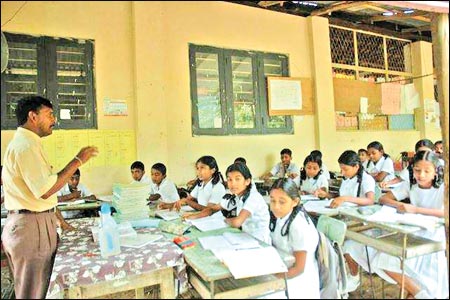|
Developing English language usage in school education
- Part IV:
Positive outcomes of bilingual education
G. H. ASOKA
Bilingual education provides learners with ample time for using the
target language, unlike in the attempt to develop English by teaching
English only as a link language in the curriculum and covering less than
four hours a week in the timetable. Learners are thus in a position to
use language widely across the curriculum.
In the Sri Lankan context, bilingual learners, in the first four
years of their learning from Grade six to nine, usually develop a
satisfactory level in achievement in using English parallel to Sinhala/
Tamil (BICS), and the mother tongue is a strong asset in developing
English through language transfer and then the learner is gradually able
to develop metalanguage skills in English, too.
Researchers of bilingual education have shown positive developments,
both at cognitive and social levels, which can be achieved through
bilingual education rather than monolingual education.
|

Learning English helps meet future challenges. File photo |
It has been revealed how strongly bilingual learners use language as
a tool for communication at local and global level, cognitive organizers
and strong socialization agents. Bilingual education is always more
demanding in knowledge economy than monolingual education.
Monolingual education
Additive aspects of this approach ensures superior school achievement
everywhere in the world and bilingual learners mostly outperform their
counterparts of monolingual education.
You can see the reality of this when the results of GCE (O/L) of 2007
and 2008 of the bilingual learners of the Government school system are
compared with that of the monolingual learners in English of the
Government assisted private schools.
Importance given to first language as a strong cognitive organizer
and initial on-grade-level academic instruction through students’ first
languages for as long as possible and then on-grade level academic
instruction through English for part of the school day is the reliable
and wise practice recommended under bilingual education ensuring the
position of learners’ first language as the first predictor of long-term
school success.
Learning strategies
This allows learners to maintain their links with family and the
school and enhance informal learning.
Another important finding regarding bilingual learners is that their
ability of using more learning strategies and consequently become more
studious through self directed learning. Their ability of handling
multiple variables easily in problem solving is another practical
reality in bilingual education.
In this way, the close link found out between bilingualism and
intelligence show that bilingual learners’ greater mental flexibility
and greater facility in concept formation, greater degree of divergent
thinking, creative thinking and verbal transformation.
At the same time, those learners become self-directed and
independent: they are automatically motivated to read more and
consequently learner empowerment is achieved through individualization
of learning.
Socio-linguistically important aspect of bilingual education in Sri
Lanka is that it develops Sri Lankan variety of English without room for
linguistic genocide.
Bilingual education allows learners to shape a dynamic identity for
them in future through the possibility of developing intercultural
dialogue and supporting each other to respect and accept different
cultures. Bilingual education also paves the way for supporting the
country to reach the goals, ‘English for all’ and English as a Life
Skill’
Bilingual education in Sri Lanka
Bilingual education has been practiced since 2001 in its recent
history of general education in Sri Lanka under the misleading term,
‘English medium education’. This interpretation has already misled many
to think that the learners are supposed to study in English from the
beginning taking it as another L1.
Therefore there are various generalizations and prejudices when the
topic is discussed under the term, ‘English medium education’: as a way
of devalourization of local languages, a strategy of closing doors for
free education, privatization of education closing doors of education to
the majority, violation of child rights, a non-necessity, a barrier for
cognitive development and so on.
It is sometimes questioned whether Sri Lanka has not produced
scientists, doctors, engineers and other veterans to work in English by
learning in the mother tongue within their school education.
They are also products of bilingual education out of the three
percent of the students who have entered the University system.
In 2001, the practice of bilingual education was introduced to the
school system without much planning and critical thinking.
Initially, this was introduced to the science stream of GCE (A/L)
classes in a few selected schools under the project called Amity School
Program and then in 2002, from Grade six to Grade 11 recommending to
learn a few subjects in English (L2) and the rest in Sinhala/Tamil (L1)
after completing the first five years only in L1.
The writer is
Chief Project Officer and Head of the Cell of Language Coordination,
Project Leader of Bilingual Education, Faculty of Languages, Humanities
and Social Sciences, National Institute of Education, Maharagama
To be continued |



